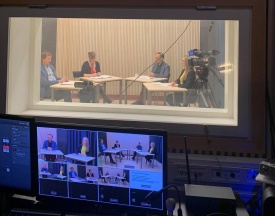One year of Jean Monnet teaching module “NearEU”
The following post originally appeared on the J. Skytte Institute’s website (June 16th)
The end of the Spring semester marks almost one year since the start of the Jean Monnet Module “Neighbourhood Enlargement and Regionalism in Europe” (NearEU) related to Europeanization of the European Union’s Eastern neighbourhood, candidate countries, and wider Europe funded by the Erasmus+ Jean Monnet programme.
The project is coordinated by the University of Tartu and led by Dr. Stefano Braghiroli – Associate Professor of European Studies and Director of the Master’s Programme in “European Union – Russia Studies” – and Ms. Anna Beitane – Manager of Online Learning Projects at the Johan Skytte Institute of Political Studies. It includes a network of partners from Albania, Armenia, Belarus, Montenegro, Poland, and Ukraine. Particular attention is devoted to the involvement of junior instructors and early stage researchers.
The module aims to create new knowledge, tools, and resources related to the evolution of partners’ and candidates’ relationship with the EU and alternative models of regionalism. NearEU is functional to the creation and the support of the new “European Union – Russia Studies” module within the framework of the master’s programme in “International relations and regional studies” at the J. Skytte Institute of Political Studies.
Despite the challenges posed by the COVID-19 pandemic all the activities planned for this year have been launched, conducted, and successfully implemented.
In particular, two new courses have been developed and offered to students for the first time, namely “Illiberal Turn in Europe and Russia” (6 ECTS) and “EU Enlargement and the Challenges of Wider Europe” (6 ECTS). The courses attracted more than 50 students, in total, and were offered in hybrid mode, thereby allowing in-class as well as remote participation. The two courses provided the students with up-to-date knowledge of actors, factors, and trends that affect institutional and political developments in the context of Europe and Eurasia. Within the framework of the courses, guest lectures were given by the module’s partnering experts.
A new 6-week MOOC on “Common Challenges of Competing Regionalisms” (2 ECTS) was designed and launched in April 2021. The course included video-lectures and interactive multimedia material by in-house Skytte staff and partnering experts of the module. The course attracted more than 550 participants from all around the world. It provided students with a practical toolkit to understand dynamics and trajectories in the field of comparative regionalism and integration processes in Europe and Eurasia.
The module also successfully launched the NearEU MasterClass series. The events are aimed to favour public discussion awareness and debate in the light of practitioners and leading scholars’ first-hand experience. During the Spring semester, four MasterClasses were held hosting Mr. Michael Hudson (investigative Pulitzer-prize winner journalist), Dr. Andriy Tyushka (College of Europe, Natolin), Mr. Christopher Forst (Director of Friederich Ebert Stiftung – Belarus), and Amb. Archil Karaulashvili (Ambassador Extraordinary and Plenipotentiary of Georgia to the Republic of Estonia). The events attracted more than 300 people in total.
In late May, the first NearEU Graduate Conference was held at the Johan Skytte Institute of Political Studies. The Conference provided final-year Master’s students with the opportunity to present their works in the format of an academic conference and receive specialized feedback from fellows, faculty staff, and doctoral students. In total 15 submissions were received and the winner of the Conference’s best-paper award was chosen. In line with the multi-disciplinary, diverse, and plural nature of the event, presentations ranged from international relations and European studies to cyber security and media studies.
The activities of the module, in the Spring semester, were finalized with a 2-day simulation of decision-making of the Council of the EU and of the Eastern Partnership Summit discussing, respectively, the situation in Belarus and the future of the Eastern Neighbourhood. More than 40 participants were involved in the role game of EU decision-making.
In the words of the module’s coordinators – Stefano Braghiroli and Anna Beitane – “this first year has proven that despite these challenging times we have been able to offer a diverse set of activities and tools to students profiting from the module and to successfully coordinate and cooperate with our partnering experts. We very much look forward to the new academic year of NearEU activities”.
For more information, please contact: Stefano Braghiroli, academic coordinator of the project and Associate Professor of European Studies, stefano.braghiroli@ut.ee




